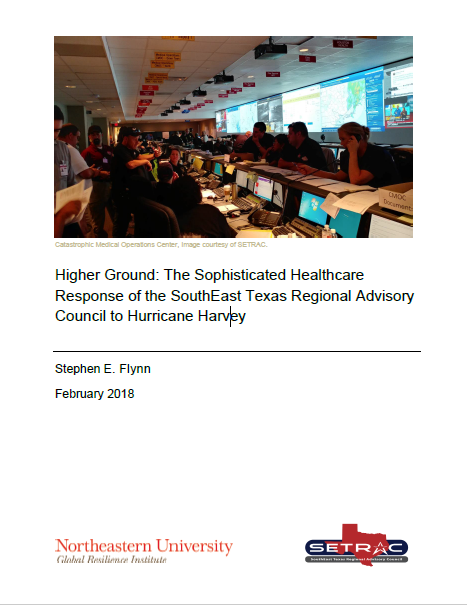GRI-SETRAC report outlines resilience model for coordinating healthcare response during and after disasters

In collaboration with the SouthEast Texas Regional Advisory Council (SETRAC), the Global Resilience Institute (GRI) completed a report outlining an effective, resilient regional healthcare response in support of the response to and recovery from major disasters.
The development of this report followed a GRI Post-Disaster Assessment and Advisory Team (PDAAT) trip to Houston after Hurricane Harvey. PDAAT collaborated with representatives from local governments, NGOs, businesses, and SETRAC to observe the lingering impacts of Hurricane Harvey and the efforts that were made to recover, and used those findings to form the basis of the report’s recommendations. Together, GRI and SETRAC outlined a model which could be adopted nationwide for fostering more effective regional, multi-jurisdictional emergency healthcare collaboration in preparation for future disasters.
The report looks at the history and development of SETRAC, from its founding in response to Hurricane Allison, the lessons SETRAC learned over the years in responding to various disasters, and SETRAC’s exceptional preparation for and response to Hurricane Harvey. It also explores the equipment, personnel, and procedures that allow SETRAC to effectively execute its duties, and the operations of other healthcare coordinating bodies in the United States.
SETRAC’s success in coordinating healthcare was demonstrated both in the preparation for Harvey, and in the direct response to the Hurricane.
To download the report click here or visit: http://bit.ly/GRIPublications
***
About the Post Disaster Assessment and Advisory Team
Northeastern’s Global Resilience Institute has assembled a group of experts with deep operational experience in disaster response. Within a few weeks of a major disaster—such as a flood, a wildfire, or a terrorist attack—GRI works with local and regional authorities to deploy a select group of those experts as an operational assessment and advisory team. Working in ways analogous to National Transportation Safety Board teams, GRI disaster teams conduct extensive analysis and in-depth interviews about the disaster, the response, and recovery efforts. Emphasizing mitigation measures in the post-disaster recovery phase, teams identify lessons learned and share that knowledge broadly, helping prepare other communities and organizations to respond more effectively to future events. Teams also share best practices with local emergency responders to help them accelerate a community’s current, ongoing recovery efforts.
Learn more by clicking here
